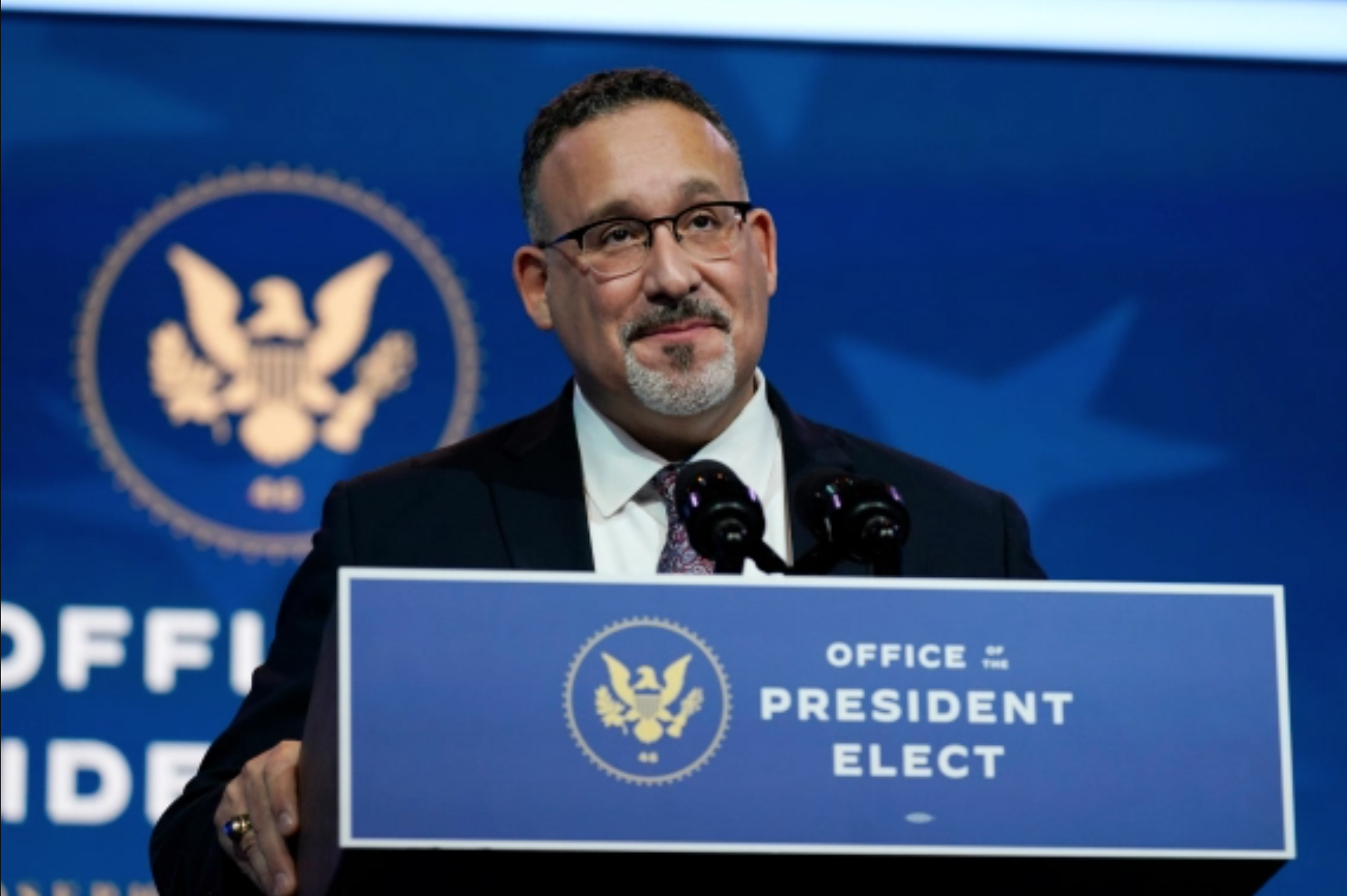
What Miguel Cardona’s appointment means for the future of U.S. schools
Cardona is the third Latino nominated to Biden's Cabinet and if confirmed, would be the third Latino to hold the position.
President-elect Joe Biden chose his Secretary of Education last week, and it was a surprise to most onlookers making guesses of who it would be.
In the end, Biden appointed the relatively-unknown Miguel A. Cardona, Connecticut’s first Latino Commissioner of Education and the first member of his family to go to college.
It startled those making bets on Lily Eskelsen García for the role, a popular choice among the Congressional Hispanic Caucus (CHC), whose members have been lobbying Biden to nominate a Latina for a cabinet position.
Some members even sent a letter to the Biden transition team, further urging Biden to nominate Eskelsen García, a prominent teacher and former labor union leader of the National Education Association — the largest union in the nation.
But Cardona emerged as a front-runner for Biden’s Secretary of Education position in the last leg, putting him above Eskelsen García, higher-ed academics, and superintendents of much larger municipalities.
He garnered the support of important stakeholders in the Biden campaign, reported the New York Times, including congressional leaders, teachers’ unions, community groups and Linda Darling Hammond.
Over the course of the campaign trail, Biden vowed to select a teacher to replace current education secretary, Betsy DeVos, who had no professional experience teaching in a school or classroom prior to her appointment.
Some teachers across the country were also surprised and disappointed with Cardona’s selection, criticizing his split time between roles as a teacher and administrator. A choice like Eskelsen García would have more thoroughly satisfied educators, but Cardona will still be a stark contrast to DeVos.
Where he has years of elementary education and administration experience at public schools, she, a billionaire and proponent of public schools she and her children attended, had none whatsoever.
To juxtapose, Cardona began his career as an elementary school teacher before moving into administrative roles, including school principal and assistant superintendent. His parents, who came to the U.S. From Puerto Rico, raised him in public housing and he attended public schools all his life.
Cardona is the third Hispanic nominated to Biden's Cabinet, and if confirmed, would be the third Hispanic to hold the top-level position.
Despite valid criticisms of tokenism within the upcoming cabinet, Biden’s pick was widely celebrated.
That was especially from Hispanic members of Congress, who though didn’t have their top pick, are pleased with the incremental increase representation.
The CHC now has all its focus set for Biden to nominate a Latina to his cabinet.
“Miguel is an educator & a fighter for educational equity! His pick as Sec. of Ed. is another great step towards experience & diversity in President-elect
@JoeBiden's cabinet,” wrote Rep. Adriano Espaillait (D-NY) on Twitter.
Miguel is an educator & a fighter for educational equity!
— Adriano Espaillat (@RepEspaillat) December 28, 2020
His pick as Sec. of Ed. is another great step towards experience & diversity in President-elect @JoeBiden's cabinet. https://t.co/fYKofm7NAy
Dismantling the DeVos era and reopening schools
First on the list is how to proceed with reopening schools amid the ongoing public health disaster.
RELATED CONTENT
In his announcement speech last week, Biden commended Cardona's leadership over this past Fall, in which he balanced online and in-person learning in Connecticut, and got all schools connected online.
In the coming months, Cardona will need to navigate a scale much larger than his jurisdiction in the third-smallest state in the country, being tasked with bringing elementary, secondary, and higher-ed institutions back from mass-closures — an undertaking that will likely cost billions.
What’s most at stake is addressing the survival of schools and students marred by systemic inequities, including disadvantaged students struggling with debt, and low-paid educators in underserved communities.
Serving as assistant schools superintendent, Cardona reportedly has experience in this regard, when he served as assistant schools superintendent, focused on drop-out rates, teacher quality, and increasing graduation rates among Black and POC students.
This is yet to be seen, and Cardona will also face questioning on his view of reopening schools in his system.
He argued in the past that it’s the most vulnerable communities that have the most to lose by not returning to in-person instruction, despite the health risk. Throughout the pandemic, he has highlighted the social and educational hazards of all-remote schooling, particularly for Black students and students of color.
But one of the biggest challenges Cardona faces will be DeVos’ rollback of rights for student sexual assault survivors in schools.
Over the summer, DeVos implemented a new policy guideline for Title IX, the federal civil rights law created to ensure gender equity in education, skewing its original intent.
The new Title IX rule speeds up sexual assault investigations, adding protections for the accused, and even allows schools to avoid responsibility for assaults entirely if they take place off campus.
It’s likely that the incoming administration will work to repeal and replace the new rules, but that process can take years.
The full process of undoing the last four years could last all of Biden’s first term.











LEAVE A COMMENT:
Join the discussion! Leave a comment.